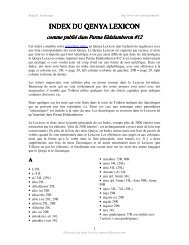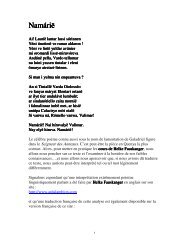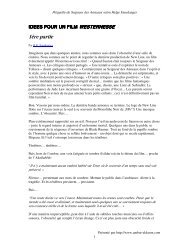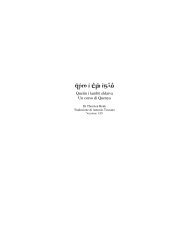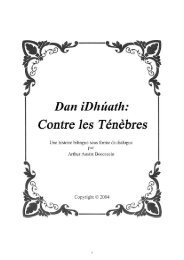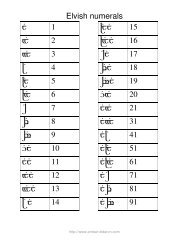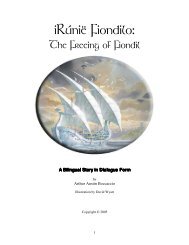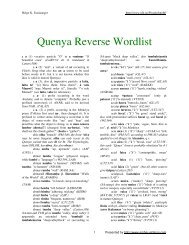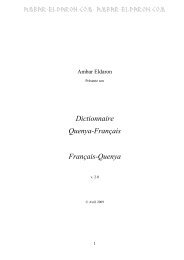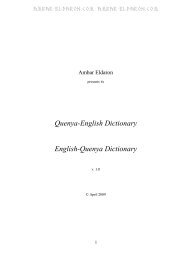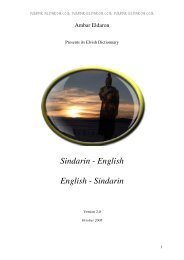English – Quenya - Ambar Eldaron
English – Quenya - Ambar Eldaron
English – Quenya - Ambar Eldaron
Create successful ePaper yourself
Turn your PDF publications into a flip-book with our unique Google optimized e-Paper software.
Helge K. Fauskanger http://www.uib.no/People/hnohf/<br />
used = riches), larma (the latter possibly "pigfat";<br />
the first part of the gloss is not certainly<br />
legible in Tolkien's manuscript. Another gloss of<br />
larma is "flesh"; in a later source a similar word<br />
is used for “raiment”.) <strong>–</strong>TIW, VT45:26<br />
FATE umbar (umbart-) (doom; the form<br />
amarto in LT2:348 could be obsolete, but ambar<br />
from the same source may be a valid word also<br />
in LotR-style <strong>Quenya</strong> <strong>–</strong> see DOOM), marto<br />
(fortune, lot); manar, mandë (doom, final end,<br />
fortune [usually = final bliss]); FATED marta<br />
(which adjective also seems to be the noun<br />
"fate" in later sources; see VT45:33, VT46:13).<br />
*LIGHT-FATED calambar <strong>–</strong><br />
MBARAT/LotR:1157, MANAD,<br />
VT45:33/VT46:12, VT49:41, 42<br />
FATHER atar (pl. atari in Etym, though<br />
the pl. form #atári occurs as part of the<br />
compound Atanatári). Dative ataren is attested<br />
(VT43:36-37). Forms like atar, atarinya ("my<br />
father") as well as atya "daddy" are said to be<br />
forms a child would use in addressing his or her<br />
father (VT47:26; see DADDY). In VT48:19, atya<br />
is explained as a contraction of at-nya "my<br />
father". The final version of the Lord's Prayer<br />
(VT43:12, 13) has #Átar with a long initial vowel<br />
(Átaremma "our father"); this #Átar may<br />
incorporate the vocative particle a (*a Atar "o<br />
Father" > #Átar). FATHER OF ALL Ilúvatar<br />
(God). <strong>–</strong>Silm:428, 229/ATA/LT1:255, VT44:16,<br />
Silm:404/UT:446, VT43:37<br />
FATHOM (noun) rangwë <strong>–</strong>RAK<br />
FAWN marya (fallow, pale) <strong>–</strong>MAD<br />
FAY OF THE COUNTRY nandin (dryad),<br />
FAY OF THE MEADS Nermi (pl. Nermir is<br />
attested) (field-spirit) <strong>–</strong>LT1:261, 262<br />
FËANOR Fëanáro (Spirit of Fire) <strong>–</strong><br />
Silm:397/435, MR:217<br />
FEAR (noun) caurë; FEAR (vb) #ruc- (the<br />
1st person aorist rucin is glossed "I feel fear or<br />
horror", constructed with "from" of the object<br />
feared, e.g. *rucin Orcollon "I fear Orcs") <strong>–</strong><br />
LT1:257, WJ:415<br />
FEAST meren (merend-), merendë<br />
(festival); FESTIVE merya <strong>–</strong>MBER<br />
FEATHER quessë <strong>–</strong>KWES, LotR:1157<br />
FEBRUARY Nénimë (Amillion in LT1:249<br />
is hardly a valid word in LotR-style <strong>Quenya</strong>.) <strong>–</strong><br />
LotR:1144<br />
FEEL: The noun felmë "emotion" (q.v.) or<br />
*"feeling" may suggest a verbal stem #fel-<br />
(compare melmë vs. mel-, "love" as noun and<br />
verb). This #fel- could then mean "to feel" in the<br />
general sense of "have an emotion". Other<br />
senses, see below.<br />
FEEL FEAR OR HORROR #ruc- (cited in<br />
source as rucin, 1st pers. aorist), constructed<br />
with "from" of the object feared. <strong>–</strong>WJ:415<br />
FEEL WITH FINGERTIPS lepta- ([to]<br />
finger; to pick up/out with the fingers) <strong>–</strong>VT44:16,<br />
VT47:10, 25<br />
FEEL WITH THE HAND, see STROKE<br />
FEELING, see EMOTION<br />
FELL (adj) aica (sharp, terrible, dire). <strong>–</strong><br />
PM:347<br />
FELL (noun) helma (skin) <strong>–</strong>SKEL<br />
FEMALE (noun) ní, FEMALE (adj.) inya,<br />
inimeitë (pl. probably *inimeisi; cf. HANDED,<br />
LEAPING, WINDY) <strong>–</strong>INI<br />
FENCE IN <strong>–</strong> see GO ROUND (under entry<br />
for GO) regarding the verb pel-<br />
FENCED FIELD peler, FENCING OR<br />
DEFENSIVE HEIGHTS Pelóri (the mountainrange<br />
at the western coast of the Blessed<br />
Realm). <strong>–</strong>PEL(ES), WJ:403<br />
FESTIVAL asar (Vanyarin athar) (fixed<br />
time), meren (merend-), merendë (feast). The<br />
word aurë is in one source defined as “a day (of<br />
light), a day of special meaning or festival”.<br />
FESTIVE merya. <strong>–</strong>WJ:399, VT49:45, MBER<br />
FETCH tulta- (send for, summon) <strong>–</strong>TUL<br />
FEY marta (fated) <strong>–</strong>MBARAT<br />
FIELD (sown field) resta (acre); compare<br />
FAIR #2. FENCED FIELD peler. FIELD-SPIRIT<br />
Nermi (pl. Nermir is attested) (fay of the meads)<br />
<strong>–</strong> VT46:11 cf. RED, PEL(ES), LT1:262<br />
FIERY uruitë, úruva (The stem from<br />
which these words are derived was struck out in<br />
Etym. However, several words that must be<br />
derived from this stem occur in LotR, indicating<br />
that Tolkien restored it. LT1:248 also gives sára<br />
"fiery", but this word is probably obsoleted by<br />
sára "bitter" in Etym.) <strong>–</strong>UR<br />
FIFTEEN lepenquë <strong>–</strong>VT48:21 (the form<br />
quailepen seems to be another, possibly<br />
experimental, word for "15" in <strong>Quenya</strong>). For the<br />
syntax of numerals, see THREE.<br />
FIFTH lempëa, replacing older (MET)<br />
lemenya. Fraction ONE FIFTH lepesta, lepsat <strong>–</strong><br />
VT42:25, VT48:11<br />
FIGHT (WITH SWORD) mahta- (wield a<br />
weapon, manage, deal with, handle); pa.t.<br />
mahtanë is attested. <strong>–</strong>MAK/MA3, VT39:11,<br />
VT45:30-32, VT47:6, 18, 19, VT49:10<br />
FILL quat- (fut #quantuva is attested in<br />
enquantuva, "will refill") <strong>–</strong>WJ:392, Nam; cf.<br />
KWAT<br />
FINAL tyelima, métima (ultimate, last);<br />
FINAL END mande, manar (fortune, bliss, fate),<br />
telda (last) <strong>–</strong>MC:222 cf. 215, MANAD, WJ:411<br />
FINARFIN Arafinwë <strong>–</strong>MR:230<br />
Wordlist last updated July 5th, 2008 28 Presented by http://www.ambar-eldaron.com



